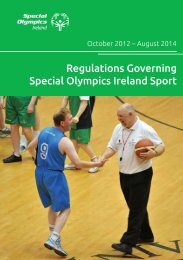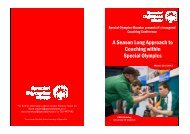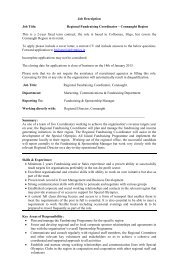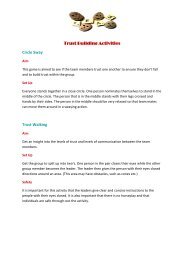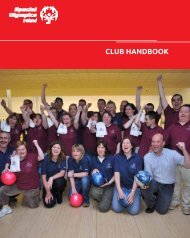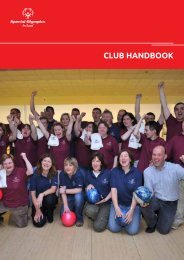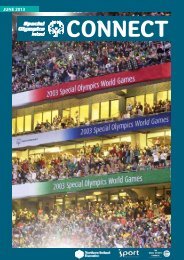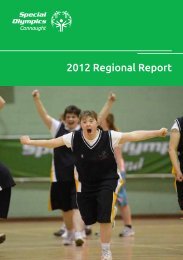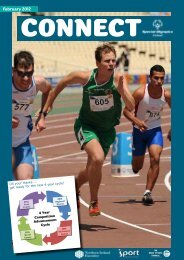<strong>Special</strong> <strong>Olympics</strong> <strong>Ireland</strong> <strong>Strategy</strong> <strong>2012</strong>-<strong>2015</strong>Review of Progress<strong>Strategy</strong> 2008-2011Five key goals were identified as the foundation for the strategy for 2008 – 2011.Despite the severe downturn in the economy, solid progress was made in relation to eachgoal, as outlined below.1. Deliver high quality programmesEmphasis has been on the development of solidplans for each sport and setting appropriatestandards aimed at improving the overall qualityof activity across the programme. Specific planshave been developed for some sports with othersyet to be completed. Minimum quality standardshave been set for running clubs and competitionevents, and tracking of these standards startedin 2011. A continuous drive to improve coachingstandards resulted in 641 coaches completingan Introductory-level coaching course and 98 3completing courses at a higher level, all certifiedby Coaching <strong>Ireland</strong>.Development Days, where athletes and coacheslearn new skills and learn more about theirsports, were successfully introduced to providean alternative participation opportunity thatcomplements the competition calendar. Thepromotion of Inter-club Activities has led to asignificant increase in the number of events beingrun between local clubs and the events are widelyrecognised as a successful means of providingmore sports opportunities for athletes.2. Strengthen activity at a communitylevel through better local supportAn initiative introduced in early 2008, calledSupport and Engagement, whereby a face-to-facemeeting was held with each local club over the firstthree years of the <strong>Strategy</strong>, has been so beneficialto all that it is now firmly rooted within the yearroundregional programme.Minimum standards are in place for the runningof clubs and these will be tracked from 2011 topromote better quality management and delivery ofclub activities. It is currently estimated that 80%3 Number only reflects coaches that undertook <strong>Special</strong> <strong>Olympics</strong><strong>Ireland</strong> specific coaching courses (approved by Coaching<strong>Ireland</strong>) and coaches who have been supported to undertakeNGB courses up until 31st October 2011.of clubs have a club management team in place, acritical minimum standard for the development of asustainable club.Regional Council Meetings (open to all members)are now a regular feature in the calendar ofevents in each region but, with just 30% of clubsrepresented at these meetings, the need toraise attendance levels remains, as they are animportant two-way information-sharing forum.3. Improve long-term sustainabilityIn order to achieve our aim of improving long-termsustainability two approaches were planned:a) to increase the proportion of core income fromgovernment sources from an annual average of34% in 2008 (€2.78m) to 50% (€4m) in 2011andb) to build up sufficient levels of reserves tounderpin continuity.By mid-2008, reaching the target of €4 millionmulti-annual funding from government was lookingextremely unlikely as the radically changingeconomic environment became more apparent.Instead, maintaining the existing governmentfunding level became the challenge.Over a three-year period, Government fundingvia the Irish Sports Council Core Grant was cut by46% to €1.5 million in 2011. In Northern <strong>Ireland</strong>,significant progress has been made, particularly in2010, to secure multi-annual government funding.Support is now very strong and indications arefavourable for securing core funding.Other revenue avenues such as sponsorship andfundraising are seeing greatly reduced returnsfor increased effort, all impacted by the changingeconomics facing corporate agencies and thegeneral public alike.6
<strong>Special</strong> <strong>Olympics</strong> <strong>Ireland</strong> <strong>Strategy</strong> <strong>2012</strong>-<strong>2015</strong>Sponsorship has remained an important part ofthe funding mix throughout the strategy period.Sponsorship opportunities have become moredifficult to put in place – companies have curtailedspending in this area, and when they do invest theyare looking for direct value in terms of commercialbenefit. Although securing sponsorship moneyhas proven more difficult over the last four years,value-in-kind continues to be a way in which asponsor can support the organisation. This provedparticularly successful during the 2010 <strong>Ireland</strong>Games.eircom remains our premier sponsor and thisrelationship celebrated its 25th Anniversary duringthe strategy period. We work very closely witheircom on all projects related to <strong>Special</strong> <strong>Olympics</strong><strong>Ireland</strong> to ensure that the company receives themaximum benefit from its investment.A new fundraising strategy, involving all revenuestreams, was implemented in January 2010. Thisstrategy is broadly welcomed by many as it is seento be more coordinated, effective and workingin unison with initiatives more locally. <strong>Special</strong><strong>Olympics</strong> <strong>Ireland</strong> currently has to fundraise over€2 for every €1 received through grant funding.It was important to address this in a coordinatedapproach with regional involvement.On the people side, attracting volunteers to take onkey committee roles saw the adoption of ateam-approach across all levels from 2008, withrevised structures and roles approved in 2010.This approach has been reasonably successfuland is widely recognised as the way to progressthe sharing of workload, responsibility and deliveryof the programme at all levels.Looking to the future, we need to work hard toprotect existing income streams and, at the sametime, establish new avenues for funding. Fundingcuts in the Health Service Executive and theresulting impact on Intellectual Disability ServiceProviders is also impacting on the delivery of<strong>Special</strong> <strong>Olympics</strong> sports programmes. Manyservices withdrew from development andcompetition activities during 2010 and did notre-affiliate at the end of that year. We mustcontinue to address this challenge to ensureathletes still have access to sports training andcompetition; this may generate an increaseddemand for new clubs in communities to fill thevoid.4. Growth across all programmesConsolidation and deliver of quality sportsprogrammes also involved building on existingactivities around the island while continuing toreach out to people with an intellectual disability.We achieved a steady, continuous growth in ourathlete membership from 2008 – 2011 and withnew athletes we also have welcomed new familymembers.The table below indicates growth rates during theperiod:Target ActualIncreaseCoaches 100 627Athletes 1,600 3,136Families 800 1,986Clubs No target set 83Volunteers No target set 6,003The 2010 Games meant an additional 3,000volunteers in the Limerick area registered for thatparticular event. The successful legacy of theGames has resulted in a total of 300 volunteersgetting actively involved in the Munster regionalprogramme on an ongoing basis.In terms of young children with an intellectualdisability who are not yet eligible to join (i.e.under 6 years of age) little work has been carriedout in this area. A means of reaching out andcommunicating with this age group is an areato be addressed.5. Ensure that involvement in <strong>Special</strong><strong>Olympics</strong> is enjoyableEnjoyment for all participants, whether that beathletes, volunteers, family members or others,is always a consideration in the planning ofactivities and, although no formal assessmentof the successful delivery of this goal has beenundertaken, our retention figures for athletesand volunteers would suggest that they are stillmotivated to be part of the programme. Ourathlete and volunteer membership numbers havecontinued to grow since 2008, and the totals at theend of October 2011 are shown below:5Current TotalAthletes 10,646Volunteers 25,10744 Number only reflects coaches that undertook <strong>Special</strong> <strong>Olympics</strong> <strong>Ireland</strong> specific coachingcourses (approved by Coaching <strong>Ireland</strong>) and coaches who have been supported toundertake NGB courses up until 31st October 2011.75 As on 31st October 2011.



